207 SQUADRON ROYAL AIR FORCE HISTORY
Memorial Service
|
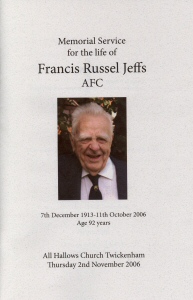 |
Music
Canon in D Major - Pachelbel
Largo from the New World Symphony - Antonin Dvorák
Organist: Phillip Booth
The Gathering
In the name of the Father and of the Son and of the Holy
Spirit.
Priest: The Lord be with you
All: And also with you
Welcome & Opening Prayer
Mother Nicola Stanley
Vicar, All Hallows Church, Twickenham
Hymn #264
All Things Bright And Beautiful omitting *starred verse
EulogyBrian Jeffs - youngest sonOur father was born in Canterbury on the 7th of December, 1913. Almost three decades later, December 7th would became known as Pearl Harbour Day. Perhaps this was some early foreshadowing that our father’s life was going to be anything but ordinary. Dad was an avid aviator from a very young age and upon leaving school he worked as a journalist while learning to fly privately. He joined the City of London Auxiliary Air Force Fighter Squadron in 1932, transferring to the RAF's High Speed Monoplane Flight in 1935. Even in those early days, dad was developing a reputation for being a tad impulsive and perhaps more than a little irresponsible at times. While with the Auxiliary Air Force prior to the war, he and his first wife, Doreen were spending the day out with his long time friend, Jack Bensted and his wife Joy. During the course of the afternoon the ladies headed off to do some shopping while the men were going to occupy their time with other matters. Knowing my father, I suspect a pint at the local pub was the order of the day. At any rate, the two young ladies ended up at the pre-arranged meeting point at the appointed time, only to wait dressed in all their finery, for our father and his good friend Jack, but they never showed. |
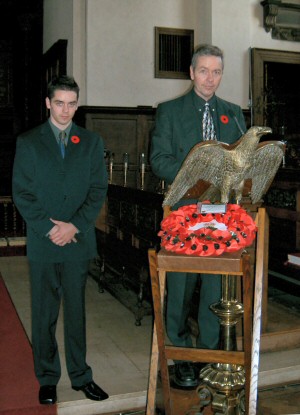 Brian Jeffs at the lectern, assisted by Ryan Jeffs |
Quite late that evening the two men returned home looking a little sheepish only to explain that, one thing had led to another, and Dad felt that he absolutely must show Jack the wonders of flight first-hand, and what better way to do so then with a trip, with our father at the controls, to Paris and back in one of Her Majesty’s aircraft.
From that point on, Jack’s wife Joy, always maintained her suspicions that her husband’s dear friend, Russ, was a bit of a bad influence.
By 1939, Dad was with No.18 Squadron (Motto: With Courage and Faith) and joined No.50 squadron (Motto: Thus We Keep Faith) as a Flight Commander in the autumn of 1941.
In May 1942, he was posted without rest to his endeared No.207 Squadron (Motto: Always Prepared), which he commanded until December, 1942. After 207 Squadron, there followed a number of flying assignments covering Africa, India, and Burma. He also served with the 82nd West African Division and encountered the Japanese in a couple of fearsome clashes.
Our father experienced an air force career that spanned more than two decades, during which time he flew those seemingly fragile biplanes which somehow defied gravity, and ultimately the first powerful jet aircraft. There were also tremendous advances in aviation technology during this period.
Dad recalled an incident to me which really brought home the daunting technological leaps in just a few short years. In the fledgling days of the night bombing campaign, an RAF crew had become disoriented at night in poor weather and mistakenly bombed an RAF airfield in Britain. As startling as this turn of events was, the worse news was to be discovered the following morning when it was found that none of the bombs had exploded, and they had consequently caused absolutely no damage. However, in just a couple of years, the RAF was carrying out truly devastating raids against the heartland of The Third Reich.
After the war, in 1946, Dad was posted to the United States to help found the All Weather Flying Division. In 1950, he became the Air Attaché to Copenhagen. The Cold War was at its deepest during this period. Our father helped establish an intelligence-gathering network with the nondescript fishing trawlers which roamed the Baltic Sea. My older brother, Jim always recalled the vast arrays of radio equipment in the basement of their home in Copenhagen.
Dad was also instrumental in delivering a Soviet MIG, whose pilot had defected to Denmark, to the Western Powers [see link]. Ironically, during his time in Copenhagen, one of his closest friends, or dare I say comrades, was his Cold War counterpart, the Soviet Attaché to Denmark, who was always very grateful to our father for tipping him off whenever the Soviet KGB was closely monitoring their own attaché’s activities!
Retiring from the RAF in 1956, he went to the United States and did not set foot in Britain for the next 25 years. Recalling his initial impressions of America many years later, he wrote, “the contrast between the States and Britain was quite overwhelming - like coming into bright sunlight from a long dark tunnel. They had serenity and optimism, a deep religious sense of having been spared another great war in their land. Memories of the Civil War still haunted them at that time, as the Vietnam war was to haunt a later generation. I believe Hitler had said that the Second World War would end with one victor - the United States, one villain - Germany, and one hero - Britain. To the people of the States, we Brits were all heroes.”
He immigrated to Canada in 1956 where he settled with his third wife, Frances, and worked for the provincial government of British Columbia for 20 years in the civil service, where he was known for his strong social conscience, and was instrumental in founding the Meals-on-Wheels programme, which would deliver a warm meal right to your dining-room table. Ironically, try as we might, the family could not coerce our father to avail himself of similar programs here in Britain, in his latter life - such was his fierce independence.
If it is true that the war hardened my father, it is also true that his service in the RAF gave him a magnificent zest for life. I can remember him returning from sailing races off the coast of British Columbia, fitting the description of a drowned water rat to a tee, but always with a broad grin from ear to ear.
There was a massive humanity about the man. As horrific as some as his experiences during the war were, it did not prevent him from enjoying life to the fullest, rather it seemed to propel him to cherish each day for its own particular events. He always saw the humour and the innocence in all people, and he was just as comfortable chatting with the gardener as the governor. Immediately after the cessation of hostilities on the European Continent during World War II, [when he was in Africa] he was speaking to his batman, who was a personal servant provided by the RAF. He said to his batman who I believe was named Julius, “Julius”, he said, “I have wonderful news, the war in Europe is finally over.” To which Julius replied, “Good show master . . . . . who won?”
During his early adult life, the sun truly never set on the British Empire, and his own involvement in those far flung operations gave him a strong sense of being part of the global community. Our father always felt that he fit in, and indeed was welcome wherever he went around the world.
Travelling to Argentina and throughout South America during, and after the 1982 Falklands War, he was always treated very warmly. He was quite amused to find that a great number of South Americans, were not only, not-at-all enamoured with the military junta of Argentina, but were genuinely grateful, that Great Britain had been so magnanimous as to not invade and occupy the entire continent.
He was quick to point out that the only branch of the Argentinian Forces to provide any real opposition to the British Expeditionary Force was the Argentinian Air Force, whose commander at the time was the only member of the Joint Chiefs to oppose the military operation to seize the islands. Our father truly revelled in life’s ironies.
Dad always had an abiding love for all animals and tended to see them in very human terms; as people in a somewhat different physical form. When I related the story of our golden retriever sounding the alarm in the middle of the night when some youngsters were getting into mischief on our property and explained how that Bailey was quite happy to bark from inside the house, but was more than a little hesitant to accompany me outdoors to have a heart to heart with the young lads; Dad quickly pointed out that Bailey is obviously Intelligence not Operations.
The Royal Air Force and World War II were of course a mammoth part of his life, a point that was driven home to me when I began to ponder his eulogy. I know that he was forever proud of his beloved Britain for as he put it, “staring defeat in the face!” for many long months in 1939 and 1940. He was also incredibly proud of the Royal Air Force which he witnessed fight against many odds to establish itself as the junior service and then play such a pivotal role in the vanquishing of Nazi Germany.
Perhaps this partially explains why he felt greatly wounded by the questions of morality that were raised in both Britain and Canada regarding the bomber offensive of 1942. This discussion was always heresy to our dad. He recently had a very enjoyable trip to Belgium where he had the opportunity to meet several Belgians who always felt that the sounds of bombs landing on their occupied homeland were re-assuring music to their ears that meant Britain had not capitulated. My father used to enjoy quoting Adolph Galland, the Chief of the German Fighter Force, who, when was asked when the people of Germany realized that the war was lost, had replied “firstly Stalingrad, secondly Hamburg”.
His service experiences never really left our father. He believed strongly in the absolute necessity of the world’s democracies to confront tyranny whenever and wherever they could. He was firmly convinced that, in the previous century, the fate of many nations had been dependent on the actions of the armed forces of Britain, Canada, and their Commonwealth Allies. He thought that trend was likely to continue well into this century.
Notwithstanding this, he would have been very proud of General Sir Richard Dannatt, the Commander of the British Army for having the moral courage to state publicly his concerns about the mission in Iraq. As my father used to say to me, “Leading from the front, always means being prepared to stand alone.”
Like many Britons, despite having survived the war physically whole, our father suffered greatly on a personal level. His first wife, Doreen was killed in a tragic accident during the war. Many years later, Russel’s mother showed me the tersely written letter which he had written her just after the incident. It read, “Dear Mom, Doreen was killed accidentally by the Home Guard. Must return to the squadron. Will be in touch. Russ”.
Their only daughter, Franny was effectively orphaned as the nation needed her father more that she did. Also during the war, he was divorced from his second wife, Ray, and lost touch completely with their daughter, Diana. As our dad explained to me just prior to my enlistment in the Canadian Air Force, “You must understand Brian that you are married to the Service and if you should choose to commit adultery at some point, by taking a wife, the family is always secondary.” While that statement may strike many of us an anachronism, there are many service spouses and family members today in Canada and Britain that would find it still valid.
It is always difficult to be certain but I think the personal sacrifices which our father, like so many young Britons and Canadians endured, had a profound effect on him in many ways. I do believe that the necessity during his early life to always put the needs of the Royal Air Force and the nation first and foremost made it difficult for him to ever fully embrace family life and its incumbent commitments.
Speaking with him this past Father’s Day, he said to me at one point, “Brian, I haven’t been a very good father.” After some thought, I replied that, “Dad, all of your children think the world of you. I know in my own experience as both a father and a son, I have made my share of mistakes. But you certainly have had a profound impact on your children. In fact, three of your children, Jim, Franny, and I, carried on the family tradition of aviation; Allyson followed your footsteps into journalism, and is now using your analytical and argumentative talents as she articles to become a lawyer; and Margaret exercises your social conscience as a health-care professional. Dad, although it was a life-lesson which I learned obliquely, you certainly taught me that the most valuable gift which any person can give, is quite simply the gift of one’s time. There was a heavy silence, which I finally ended with a phrase I heard him use so very often, “So there you have it.”
I feel that it was likely always meant to be that our father should someday return to Britain and so he did, for the last time in 2003. In the twilight years of his life, he cherished very much his re-connection with 207 Squadron. I saw in his latter life, a much more vulnerable man in our father. The many social and commemorative events, in which he was asked to participate, brought home to him how much adversity he had shared on many levels with his nation, his squadron, and his family.
I therefore think that our father would be pleased to conclude his eulogy with the motto which the Royal Air Force and the Royal Canadian Air Force share, which is the Latin phrase Per Ardua ad Astra which means “Through Adversity to the Stars”.
Dad has made it through his adversity and now rests peacefully amongst the stars.
Address
Mother Nicola Stanley
Sadly I never met Russel, but I feel as though I’ve learnt quite a lot about him over the past few weeks. He sounds to have been a quite remarkable person, someone who lived all but the last six years of his long life in the 20th century, and a man who was therefore formed and shaped by the great events of that time – in particular the two World Wars – he was born just before the outbreak of the First World War and served during the Second World War.
Russel sacrificed much for his country and in that sense he led an exemplary, distinguished life. It’s a testimony to the esteem in which you held him that all of you are here today to say farewell. Family have flown thousands of miles to participate in this service, and much care, time and effort have been spent in putting together the running order of our worship. We even have service sheets which were printed in Canada!
At this point I’d also like to say that I know that the family have organised refreshments for after the service, at the back of the church, and they’ve asked me to invite everyone to join them.
Brian spoke movingly and honestly of his father’s life, and I can’t add to that on a personal note. What I can say is that as Christians we believe that death is not the end of the story. Of course it is the end of our earthly existence, life as we know it, which is what makes it so sad for those who are left behind. But we are promised that there’s more to come – death is merely a new and unknown stage in our journey with God.
Victor Hugo wrote an analogy of death in which he likened dying to setting sail in a ship, heading for a far horizon. Given that Russel’s passion seems to have been for flying rather than sailing, I’ll change the focus from that of a ship to a plane – taking off into a clear blue sky, with a crowd of people standing on the airstrip waving and calling ‘goodbye, goodbye’, as they watch the machine soar upwards. They strain to see as the plane becomes a speck in the distance. Beyond the horizon another group is waiting, eyes peeled to catch a first glimpse – as the plane comes into view a great shout goes up – ‘here it comes, he’s arrived’!
My prayer for Russel is that his journey continues, that he now sees God face to face and that for him and for all of us, death is not the end, but a new stage in our relationship with God, who is the source of all life. Amen.
Hymn #488
Jerusalem
New Testament Reading
Romans 8: 31-end
Mother Hannah Reynolds, Curate
Poem Reading
Andrew and Elizabeth Jeffs, children of Jim Jeffs - eldest son
The Road Not Taken, by Robert Lee Frost
Two roads diverged in a yellow wood,
And sorry I could not travel both
And be one traveler, long I stood
And looked down one as far as I could
To where it bent in the undergrowth;Then took the other, as just as fair,
And having perhaps the better claim,
Because it was grassy and wanted wear;
Though as for that the passing there
Had worn them really about the same,And both that morning equally lay
In leaves no step had trodden black.
Oh, I kept the first for another day!
Yet knowing how way leads on to way,
I doubted if I should ever come back.I shall be telling this with a sigh
Somewhere ages and ages hence:
Two roads diverged in a wood, and I -
I took the one less traveled by,
And that has made all the difference.
Prayers
Mother Hannah Reynolds, Curate
The Lords Prayer
Hymn #435
Onward Christian Soldiers
omitting verse #3
Final Blessing
Music
RAF March Past - Walford Davies
Spitfire Prelude - Walton
Donations in memory of Russel may be made to the RAF Benevolent Fund.
High Flight
Oh! I have slipped the surly bonds of earth
And danced the skies on laughter-silvered wings;
Sunward I've climbed, and joined the tumbling mirth
Of sun-split clouds - and done a hundred things
You have not dreamed of - wheeled and soared and swung
High in the sunlit silence. Hov'ring there
I've chased the shouting wind along, and flung
My eager craft through footless halls of air.
Up, up the long delirious, burning blue,
I've topped the windswept heights with easy grace
Where never lark, or even eagle flew -
And, while with silent lifting mind I've trod
The high untresspassed sanctity of space,
Put out my hand and touched the face of God.
Pilot Officer Gillespie Magee
No.412 Squadron RCAF
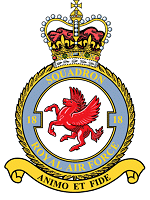 18 Squadron |
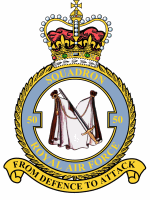 50 Squadron |
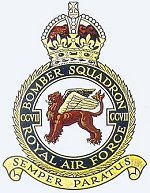 207 Squadron |
The death of Mrs Doreen Jeffs in 1940
In 1940 the pilots on the unit with which Russ was then serving, 18 Sqn or 50 Sqn were sent on rest leave. Russ and his first wife Doreen went down to Mevagissey. They were driving back from a do, along a road which later it was claimed that Russ should have known not to use. There was an 18 yr old soldier on this road who had been told that there should be no traffic on it and that anything that did turn up was to be treated as hostile. He shot at Russ’s car, after he said he had shouted a warning. Doreen was hit and Russ drove her to hospital where she died. Russ was held 50% responsible.
Source: Fran Jeffs, daughter of that marriage.
St Clement Danes
Russ was involved with the Blitz-destroyed St Clement Danes being set up as the Central Church of the RAF.
All Hallows, Twickenham Parish Church
Photos
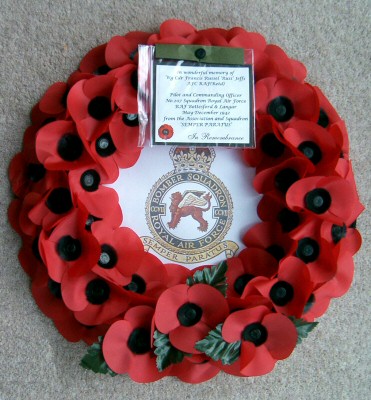 The wreath from the Association and the Squadron. This was taken back to Canada after the service. Please click for a larger image. |
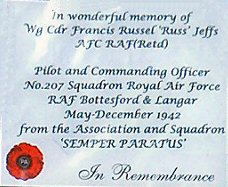 |
Displayed on entering the church
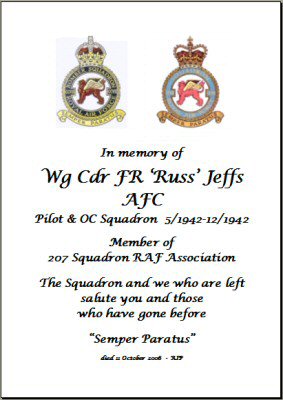 Association Memorial card (not actual full page size) |
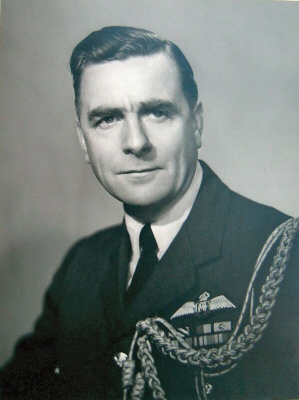 Russ when UK Air Attache |
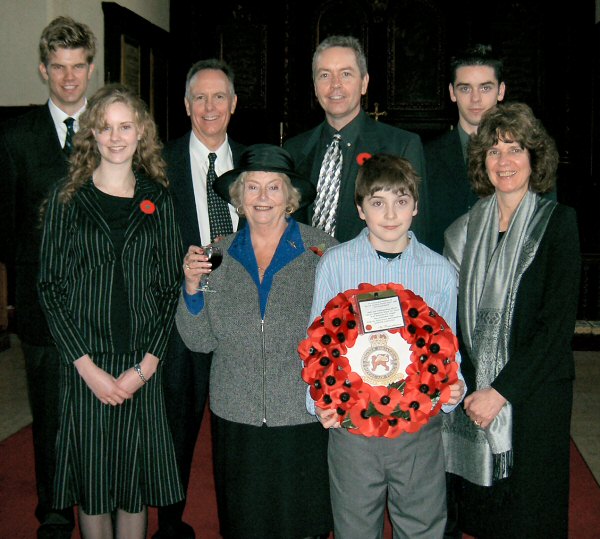
The family: L-R back: Andrew - Jim - Brian - Ryan
front: Elizabeth - Fran - Nicholas - Isobel
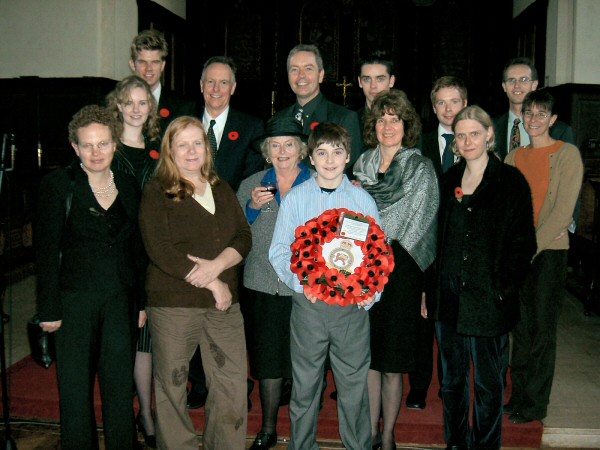
Including the wider Jeffs family
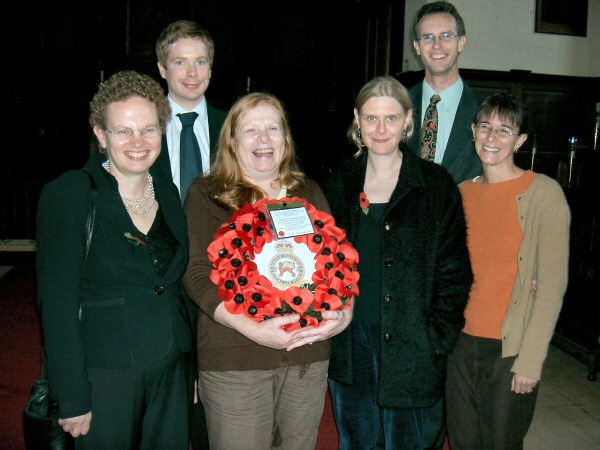
L-R: 1 - 2 - 3 - 4 - 5 - 6
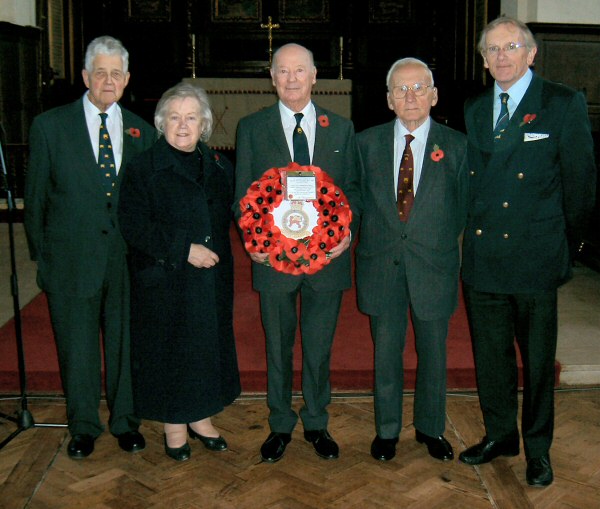
207 Squadron RAF Association L-R: Tony and Beverly Ruth -
Thos Murray DSO DFC*
John Banfield - Nigel Lodge
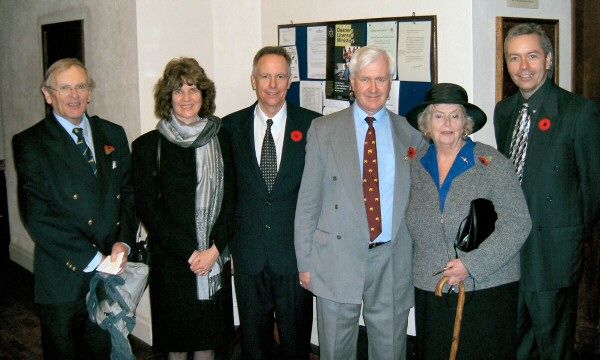
L-R: Nigel Lodge - Isobel and Jim Jeffs - Frank Haslam - Fran
Jeffs - Brian Jeffs
It is understood that a Memorial Service was also to take place in Canada
Page last updated 25 Nov 6: 31 Dec 13
Images: Haslam unless otherwise stated